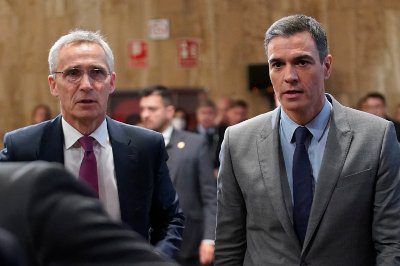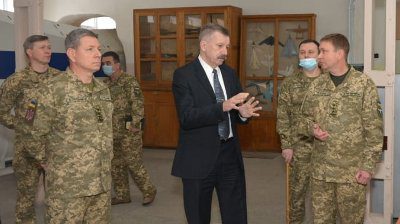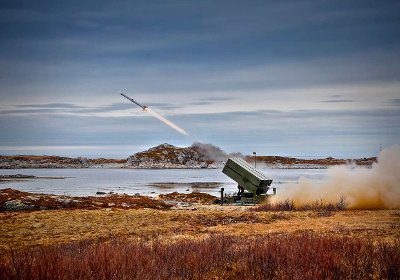Work has been frantic to find a diplomatic solution to the Ukraine war since Russia captured Crimea and supported rebels in Donbass in 2014. In the past year, diplomatic efforts have hit a wall created by Putin’s war of aggression.
The State Department says Russia is now showing no real willingness to negotiate and it is difficult to envisage a political solution to the conflict.
The Ukrainians regained large areas, including in Kherson, which Russia considered Russian after the annexation. Defense experts say they could realistically reach Crimea this winter or liberate more of Donbass. Then Putin’s army was cornered.

Read also
USA: – Mounting evidence of systematic war crimes in Ukraine
Avoid forcing Putin into a nuclear lease
– If Ukrainian troops move to Crimea, the situation will be tragic, which the Americans also fear. This is because Crimea means a lot to Russian security, says Professor Tormod Heyer of the Staff School at NTB.
He says Russia would lose control of the strategic sea lanes through the Black Sea if Ukraine seized Crimea.
– Thus, Russia will return to the southern side, with no opportunity to defend itself against Western blockades in crises and wars. Perhaps that is why the United States has, diplomatically, encouraged the Ukrainians to engage in more dialogue, says Heyer.

Read also
Stoltenberg: – Now we welcome Sweden and Finland
– At least in order to avoid forcing Putin into a situation where the use of nuclear weapons becomes the lesser of two evils, he says.
It’s hard to say anything about him with certainty, says Lieutenant Colonel Bali Yedistepo, head of the Ground Forces Department at the Staff School.
The nuclear issue
– So far, Putin has made many attempts to set political “red lines” and made various threats, both direct and implicit, about escalation and reactions if they are crossed. So far they have not taken threats beyond their traditional capabilities, which are constantly being weakened or consumed, Ydstebø tells NTB.
– They have played the power card, and they have few means of hard power at the international level. The key question, he adds, is whether the Russians have become so desperate that they take seriously the threat of nuclear weapons, which has been a recurring psychological game since the invasion.
Read also
200 Norwegian soldiers guard NATO’s eastern flank: – We have everything packed and ready in case something happens.
Testpo says he doesn’t know, but still considers it highly unlikely.
Militarily, they will not achieve much with a tactical nuclear charge. Politically, it’s something completely different, he says.
It is the nuclear threat and the tools that Vladimir Putin has left to respond to the Ukrainians’ advance on the battlefield that could cause unrest in the West. After the annexation of new Ukrainian regions last fall, it was pointed out that the loss of these regions could provoke strong reactions such as intensified bombing, attacks on nuclear power plants, and new threats with nuclear weapons.
– Ukraine has time on its side
Since then, Ukraine has made major reconquests. Putin’s new map of Russia contains major holes. Ydstebø says Ukraine could get to Crimea this winter if the conditions are right for it. Crimea has been described as a game-changer in its own right, but none of Putin’s military moves appear to be stopping the Ukrainian advance.

Read also
The Ukrainian defense stopped with a startling statement
In Moscow and Kiev, both sides now face a dilemma: Should they explore the possibilities of peace talks or continue the war? Both want to negotiate from the strongest possible starting point. Heyer says Ukraine has time on its side.
– Because there are no quick solutions to the Russians’ defense problems. Moreover, the corruption and false internal reporting of our defense capabilities runs very deep. An increase in the concentration of soldiers at the front will not help either. For Putin’s forces, they lack both technology and leadership, two of the most important criteria for success needed to match the counteroffensive in Ukraine, he says.
Zelensky’s big problem
Haier notes that it would be in the interest of many Western countries to try to coax Ukraine into negotiations now. But the success of the country’s forces could make it difficult for Kyiv when one of Moscow’s constant demands is, among other things, the preservation of Crimea.
Zelensky has to deal with a more optimistic domestic political landscape after the successful fall offensive. Thus, Zelensky will also have problems convincing his compatriots that Crimea is lost. Admitting this, Heyer says, would dampen the fighting morale of the advancing soldiers, while at the same time dampening their popularity back home.

Read also
The Norwegian Air Force is causing a stir in Ukraine: – Impressive
Therefore, the most difficult task for diplomacy is to find solutions that both Putin and Zelensky can live with. At the moment, the interests do not seem to overlap enough. He adds that this means that the war may continue for a long time.
UD: There is no willingness to negotiate
Foreign Minister Eyvind Vad Peterson at the Foreign Office says there is no indication of a real willingness to negotiate on the Russian side. He says the war must end, but it is important to remember that it is a war of aggression in violation of international law.
– Ukraine is engaged in a legitimate defensive conflict, which we fully support. It is now important that we all maintain this support to ensure that Ukraine continues to exist as a free and independent country, says Peterson on NTB.
– It should be absolutely clear that Ukraine itself must be in the driver’s seat in any negotiations. He points out that a solution cannot be imposed from outside.
Peterson says it’s hard to imagine what a political solution to the war should look like.
– Russian aggressive war is absolutely unacceptable. It is important, he says, that Russia is not now allowed to use the negotiations as an excuse to consolidate its positions and attack with renewed vigor.

“Organizer. Social media geek. General communicator. Bacon scholar. Proud pop culture trailblazer.”

